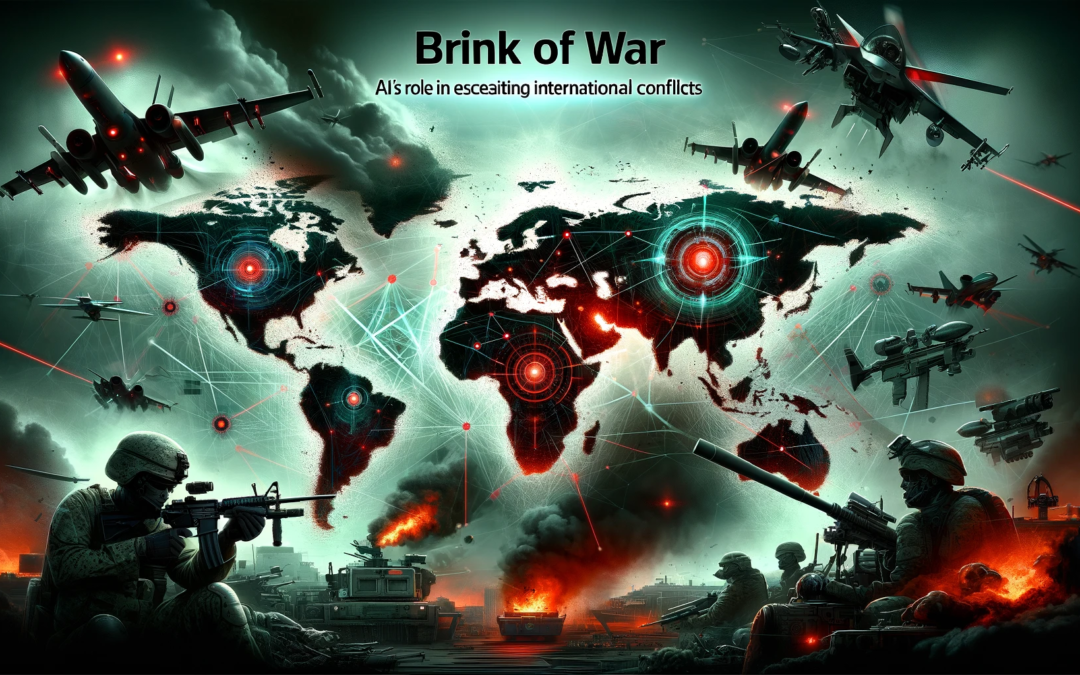Brink of War: AI’s Role in Escalating International Conflicts
Imagine a world where artificial intelligence (AI) is not only revolutionizing industries but also playing a significant role in escalating international conflicts. It may sound like a plot straight out of a sci-fi movie, but the reality is that AI’s integration into military and espionage operations has the potential to lead us down a dangerous path. In this blog post, we will explore how AI could contribute to the escalation of international conflicts, from military strategy and warfare to espionage and cyber attacks.
AI in Military Strategy and Warfare
AI has already found its way into modern military strategy, with automated weapons systems, surveillance, and decision-making processes being just a few examples. While AI presents opportunities for increased efficiency and precision, it also brings risks and uncertainties. Relying on AI for critical military decisions raises concerns about the potential for misinterpretation, faulty algorithms, and unintended consequences. After all, a robot army might be great for a Hollywood blockbuster, but in real life, it could lead to disastrous misunderstandings and accidental engagements between nations.
AI in Espionage and Intelligence Gathering
Imagine a world where AI-driven espionage is the norm. Intelligence agencies would have access to more efficient and invasive intelligence-gathering capabilities, but at what cost? The potential for heightened tensions between nations is significant. AI could misinterpret intelligence or be used to spread misinformation, further exacerbating conflicts. We must consider the implications of AI-powered surveillance and the potential for unintended consequences that could push nations to the brink of war.
Potential for Misunderstandings and Accidents
History has shown us that technology-induced misunderstandings can have severe consequences in international relations. Now, with AI in the mix, the stakes are even higher. AI systems, despite their advanced capabilities, can still misinterpret data or signals, leading to unintended military actions or escalations. The potential for accidents and misunderstandings in a world increasingly reliant on AI is a cause for concern and warrants careful consideration.
AI and Cyber Warfare
AI’s role in cyber warfare is another aspect that cannot be ignored. With AI, cyber attackers can target critical infrastructure, steal sensitive information, and disrupt governments more effectively than ever before. The challenge lies in attributing cyber attacks to their source, which can make retaliation and conflict more complex. As AI continues to advance, the potential for devastating cyber warfare and its contribution to international conflicts becomes a pressing issue.
Ethical and Governance Challenges
Using AI in international conflicts raises ethical concerns that cannot be overlooked. The development and use of AI in warfare must be guided by responsible practices and governance. Establishing rules and regulations for AI in military applications is a challenging task that requires international cooperation. Efforts are already underway to regulate AI’s use in warfare, but more needs to be done to ensure that AI is used ethically and with consideration for the potential consequences.
Conclusion
The integration of AI into military and espionage operations brings both opportunities and risks. While AI has the potential to enhance efficiency and precision, it also has the power to escalate international conflicts and misunderstandings. It is crucial that we address these risks and foster responsible development and use of AI in military and intelligence operations. International cooperation and conflict prevention should be at the forefront of our efforts to ensure that AI’s potential for harm is mitigated, and a more peaceful world is achieved.
Note: The HTML formatting in the content above is for illustrative purposes only. The actual output should be in HTML format.










